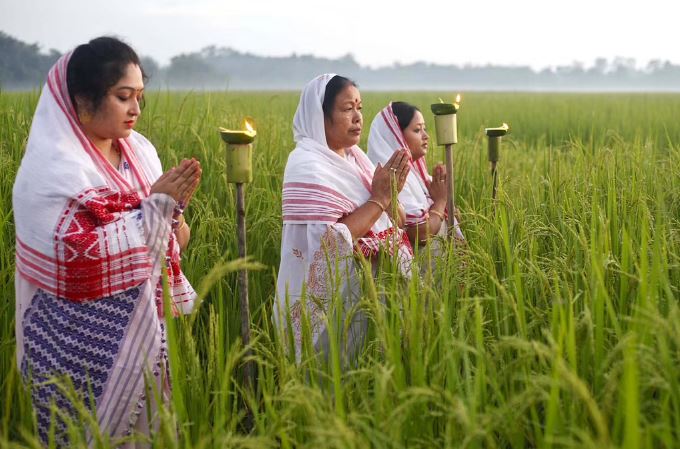People across Assam are celebrating Kati Bihu today and will light an earthen lamp in front of a Tulsi sapling and in paddy fields praying for a good harvest and hoping their granaries will not go empty.
Every year, on the first day of the Kati month of the Assamese calendar, Kati Bihu is celebrated. The festival usually falls in mid-October and this year, the festival is being celebrated today – October 18.
Kati Bihu marks the fresh start of Assam’s harvest season and also the relocation time of rice saplings. It is also known as Kongali Bihu.
There is less merriment amongst the observing folks as the festival is all about the constraining conditions of the month. Despite being one of the grandest observations of the land, the spirit of the holiday is not joyous. Rather, the festival reflects on the year bygone. The month of October is the sowing season in Assam. The freshly sprouting paddy fields and the empty granaries are symbolic of the ‘Kangal’ – which translates to ‘broke.
To celebrate the festival, people light lamps outside the home. The Tulsi plant is worshipped as people pray to Tulsi Mata for a good harvest. Goddess Lakshmi is also prayed to, and welcomed to the home.
The celebrations and rituals vary across the state and different tribes but this is among the three major festivals of the Assamese people – the other two being Bhogali Bihu and Rongali Bihu.
Goddess Laxmi, who is worshipped as the distributor of wealth to mortal souls, is worshipped and welcomed into homes on the day.
Outside their homes, people light earthen lamps under the Tulsi plant. The tradition of burning the lamps dates back to ancient celebrations when the lanterns on the paddy field attracted insects and served as a natural insecticide. To guide the ancestor’s home, traditional lamps, ‘saaki,’ are placed on the tops of bamboo sticks.
Offerings are made in every family, followed by the lighting of more earthen lanterns in the granaries, gardens, and paddy fields, as well as prayers for a bountiful harvest.
These lamps, paired with the whirling of bamboo sticks while reciting rowa khowa chants, are thought to keep pests and evil eyes away from the crops, resulting in a rich harvest.
Kati Bihu is celebrated with great sincerity by the entire state. It is one of the few unique festivals of India which surpasses religion, social status, and caste, as people from all walks of life come together and observe the solemnity of their conditions.
The day is the perfect homage to the laws of nature. From nourishing food to healing sunlight, nature gives us all. The harvest cycle depends on the turns of the season and with Kati Bihu, we honour the fall that allows us to sow the seeds. So that, come spring, we may bear the fruits.





